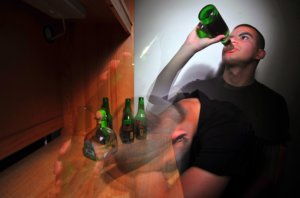
DTs, or delirium tremens, is a rapid attack of disturbing, possibly life-threatening symptoms brought about by abrupt cessation of alcohol. It is sometimes referred to as Alcohol Withdrawal Delerium (AWD.)
The typical onset of symptoms is about 72 hours after the last drink and persists for another 2-3 days.
About 50% of alcoholics will experience withdrawal symptoms upon cessation. Of these, up to 5% will develop DTs or have seizures. Long-term alcoholics are at the greatest risk for DTs, especially if they are suddenly unable to drink without immediate access to medical care.
- Shaking and shivering
- Sweating
- Arrhythmia (irregular heartbeat)
- Hallucinations
- Elevated body temperature
- Seizures
Signs and Symptoms of Delerium Tremens (DTs)?
The primary symptoms of DTs include the following:
- Nightmares and disturbed sleep
- Agitation
- Confusion and disorientation
- Hallucinations and environmental illusions (visual, auditory)
- Formication (tactile hallucinations “crawling skin”)
- Fever
- Hypertension
- Excessive sweating
- Increased heart rate
Moreover, DTs is the most severe sign of alcohol withdrawal syndrome. DTs often include intense feelings of fear, anxiety, paranoia, approaching doom, and imminent death.
DTs can also produce uncontrollable tremors in the extremities, panic attacks, and confusion. The latter is frequently noticed by others as those suffering from DTs often have difficulty constructing simple sentences and performing basic calculations.
The usual cause of death during an episode of DTs is cardiac collapse.
What Causes Delerium Tremens?

The exact cause of DTs is up for debate but is widely thought to be related to the neurotransmitter GABA, a chemical responsible for inducing relaxation and peace.
Moreover, drinking extreme amounts of alcohol, especially over a long period, impacts the body’s ability to regulate GABA.
To elaborate, when a person drinks excessively, experts believe that the body begins to mistake alcohol for GABA, and as a result, reduces production. So when a chronic alcohol abuser stops drinking abruptly, alcohol levels decline, and the body interprets this not having enough GABA to properly function.
This condition then leads to DTs. Christopher Pelic, MD and Hugh Myrick, MD stated the following in the journal Current Psychiatry (2003).
” The implication is that withdrawing alcohol triggers an “excitatory state” until the brain can readjust the fine balance between excitation and inhibition, a process that takes weeks to months. Some changes may never reverse because of the neurotoxic effects of alcohol and alcohol withdrawal.”
Is DTs the Same as Alcoholic Hallucinosis?
Delirium tremens is different from alcoholic hallucinosis (AH) as the latter manifests in around 20 percent of alcoholics admitted to a hospital and is not often fatal. DTs, on the other hand, is rarer and occurs in up to 10% of alcoholics, yet is fatal 15-40% of the time, depending on whether or not the individual receives treatment.
Finally, DTs are often characterized by “altered sensorium” or a full hallucinogenic experience without real-world perception. AH is rarer, and is usually limited to intense, acoustic, auditory hallucinations.
Treatment for DTs

Alcohol-induced DTs often require aggressive treatment and high doses of benzodiazepines (benzos) may be needed to avoid death.
Through the worse phase of DTs, the person typically remains sedated with benzos such as diazepam (Valium) or lorazepam (Ativan.)
Other pharmaceutical treatments include Haloperidol, an antipsychotic, intravenous thiamine, and Acamprosate.
Treatment should ideally be administered in intensive care unit. As noted, the death rate without treatment is about 15%-40%, but medically supervised patients die in approximately 1%-4% of cases.
Delerium Tremens: A Case Study
The following story (with minor edits) originated from Reddit and details a individuals’ personal experience with DTs.
“When I stopped drinking I was fantastically anxious. My ears were ringing, and it felt like I was surrounded by static. In fact, I felt like the world was closing in on me.
I went to lunch at a regular place, and I was sweating. I could not hear my lunch companion, but I could see her lips moving and [the sounds of] her eating. [And]…the guy across the restaurant, five tables away, I imagined I could hear his conversation as clear as a bell.
I returned to my office, and I had a panic attack believing irrationally that if I continued standing or walking around, I would be sucked out of my office window and that I would fall to my death. I laid down on my carpet and sunk my fingers into the pile of the carpet for safety. My heart was racing.
Everything I looked at was washed out…or looked as if it had been burned out. I had intrusive thoughts, and I could not sleep. The panic, the sweats, the crazy thoughts, the audio hallucinations, and the panic and racing thoughts continued for a few days, but [they were] never as bad as this meltdown moment around the first day or two.”
Getting More Information
We provide a comprehensive, holistic method to treatment, encompassing a wide array of different evidence-based practices in combination. All of Midwood Addiction Treatment’s primary therapists are either licensed or master’s level clinicians.
Our programs are structured with various components of evidence-based treatment practices and holistic approaches to treatment that provide our patients with the knowledge and tools they need to be successful in their recovery.
If you or your loved one is suffering from substance abuse, please seek help as soon as possible.
Call us now to learn about our treatment options.